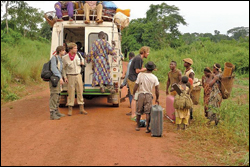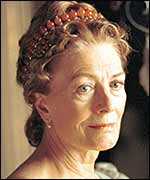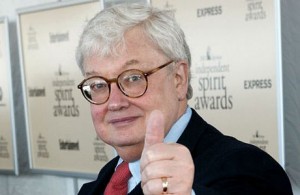 “Oka!” is a simply wonderful movie based on the real-life story of music scholar Louis Sarno, who left New Jersey to study the music of Central Africa. I spoke to director Lavinia Currier about casting the film and what the natives thought of it when it was done.
“Oka!” is a simply wonderful movie based on the real-life story of music scholar Louis Sarno, who left New Jersey to study the music of Central Africa. I spoke to director Lavinia Currier about casting the film and what the natives thought of it when it was done.
I would never of thought of British actor Kris Marshall (“Traffic Light” and the guy who meets all the supermodels in Milwaukee in “Love, Actually”) for the part of a guy from New Jersey, but he is just perfect in the role.
He is wonderful at physical comedy. He knows how to work his body, as you can see in “Love, Actually,” and “Death at a Funeral” and also the Noel Coward movie, “Easy Virtue.” Especially for a British actor, I liked that he could do body comedy. And British actors really hold up well in adverse conditions! The only thing to do on days off was play in the river so he and all the crew would be jumping in the river all the time and he got some hideous parasite. So for a big percentage of the shoot he was quite ill but he never missed a day of work. And being British he liked to be text-based and we had no text, essentially, so he learned Oka and was very proud of his Oka. I was so glad to have him because he was wonderfully inventive but also a trouper. He is an urban person, but so is Louis Sarno. He is not particularly sporty or outdoorsy. He does not spend his summers camping. It was his intellectual interest that took him to Africa. People said, “He’s a character actor, not a leading man.” But that was perfect because he is playing a character with some courage but not a hero.
I was also stunned by the cinematography, which is just gorgeous and more high-end than you normally see in small-budget films.
I met Conrad Hall through my producer who has a strong connection with his sister and had met his dad years ago. What I liked about him is that he insisted on a kind of classical approach to the film. I might have wanted to be more quick and dirty, more hand-held, smaller equipment. We wanted to shoot in 35 because we wanted to do justice to the landscape but we also needed a camera that could handle the humidity. Conrad insisted on quite cumbersome equipment but it served us well because it allowed us to maintain the feeling of a feature film and not a documentary. We had very primitive and limited ability to light but he did a great job.
Tell me about filming in the wilds of Africa.
People said, “Aren’t you scared of bugs or snakes?” But I wasn’t. The fear I had was the pygmies would be willing to take the job and then as soon as they had more money than they’d ever seen, which they would after two weeks of filming, they would say, “We have enough money now; we’re going hunting.” We did a long period of preparation and exercises and determined who had concentration and was right for the part but we kept three people for every part. About three weeks into our ten-week shoot some of them took leadership and were really into it. It suddenly clicked in and still I’m not sure why but when the others were clowning around they would make them stop. After the film was finished we took it back there to show them and asked them how they felt about it and why they decided to do it. Some said it was great to be respected and had employment. But they didn’t relate to it the way I might do, to say, “This is my story and I want to share it with the world.” It was more that they embraced what we were doing and went with it, and you could really feel it palpably when it happened. Something about being with the Bayaka, you feel more optimistic about human nature. They are really fun, nice, resourceful and playful people. They don’t have an easy life. But they’re just cheerful.
Is that because of their music? Or is the music a reflection of their spirit?
I talked to Louis Sarno about the music a lot. I don’t pretend to understand it because it is actually very complex. They use 28 phrases and Western music is like 4. But Louis says that their music is played the way nature plays music, they wait for a niche to jump into. Sometimes they sound like birds — they are incredible mimics. They could mimic us speaking English even if they didn’t know what the words meant. I had a Chinese bicycle and finally it fell apart and so I was walking and I heard a sound behind me and there were two children behind me imitating my bicycle! Often at the end of the day we would see them sitting in a circle recapping the day, laughing and imitating what happened during the day. Louis said, “Each one of you has a nickname and you’ll never know what it is.”
How did you come to this story?
I went to Central Africa 12 years ago to cast a film about a famous story about a pygmy named Otabenga who was brought to the World’s Fair in 1905. It was a tragic story. he actually was exhibited in the Bronx zoo and then was taken to Virginia by African-Americans who tried to convert him to Christianity and he committed suicide. We had this screenplay I loved that I wrote with a partner and everyone who read it cried. I met Louis as a translator. I began to have my doubts. I felt like I would be doing to the pygmy actor what the Americans did to Otabenga. The Bayakans said, “That’s a terrible story! Why do you want to remember that?” I went back to Louis and said, “Let’s do something contemporary, and talk about some of what you’ve faced and what the Bayakans have in their daily life.” He had written a memoir but it was in storage with his mother so it took a while to fish it out. I read it and I laughed. He was so self-effacing and so not the white hero saving the natives but someone who finally found his home.
 I did not like “Anonymous,” the new film speculating that Shakespeare’s plays were written by the Earl of Oxford. (They were not.) But I did enjoy Vanessa Redgrave’s luminous performance as Queen Elizabeth, with her daughter Joely Richardson playing the queen in her younger days. It completes Redgrave’s sweep of the era. In “A Man for All Seasons,” she appears briefly but unforgettably as Queen Elizabeth’s mother, Anne Boleyn, so mesmerizing it is easy to understand why a king would change the world to marry her. And she also played Elizabeth’s greatest rival in the title role of “Mary Queen of Scots.”
I did not like “Anonymous,” the new film speculating that Shakespeare’s plays were written by the Earl of Oxford. (They were not.) But I did enjoy Vanessa Redgrave’s luminous performance as Queen Elizabeth, with her daughter Joely Richardson playing the queen in her younger days. It completes Redgrave’s sweep of the era. In “A Man for All Seasons,” she appears briefly but unforgettably as Queen Elizabeth’s mother, Anne Boleyn, so mesmerizing it is easy to understand why a king would change the world to marry her. And she also played Elizabeth’s greatest rival in the title role of “Mary Queen of Scots.”



